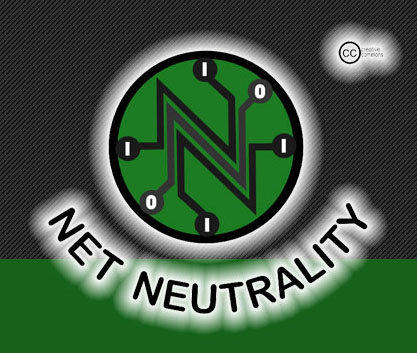The Internet should not be looked at as a tollway. Some want to change the Information Superhighway into a bureaucratic tollway which does nothing for increasing regional economic development, but does do a lot for impeding our overall global competitiveness.
The sad thing is that most people in government do not see this because they are blinded and dazzled by those lobbyists from large incumbent phone companies and cable companies who want a regulatory framework that protects their cash cows and restricts competition. Competition is good, especially when it comes to alternative high-speed networks and communication services.
Many times, those in both state and federal regulatory positions are put in place as a political “thank you” for contributions and support, but are not put in place because they understand both the network technology as well as the economic underpinnings of how the network infrastructure layer supports the overall “Platform for Commerce”.
Where do they get their education as to the technology and its impact on society and the economy? They get it from the lobbyists who are constantly buzzing around them and giving them their insights on “what is best for the state or nation”. Their main function is to keep regulators in the dark when it comes to new technology and innovation, but keep them right on top of what is their corporate strategy’s best solution for the sustaining of the network architecture that is in place which the phone companies have made back their investment several times over already.
 WAKE UP. LEARN THE GAME BEFORE YOU PLAY THE SPORT
WAKE UP. LEARN THE GAME BEFORE YOU PLAY THE SPORT
There are many who want new services, but have no clue as to the capital investment involved in adding network infrastructure. This is a valid argument against those who have no clue when they expect faster services but do not realize that you have to pay for upgrades in network technology.
Nothing is free. It takes money to build a solid, high-speed network. That network needs to be fully redundant with no single-point-of-failure if those implementing want to attract
a quality customer base.
That being said, there are companies pharmacy that want to do this and pursue those in the market who want broadband connectivity.
Those start-up companies should be given the chance to build their networks and service clients. They would add another dimension to the current network services already offered. They would increase choices and spur competition which is good for the average consumer.
The incumbent companies do not want the competition. They would rather spend tens of millions of dollars on a negative ad campaign or a regulatory blitz of condemning and thwarting any type of start-up than improving their own network infrastructure which it growing more obsolete on a daily basis. This type of negative campaign actually happened several years ago when a municipality wanted to expand its electrical service to the residents of three municipalities. They were defeated by an aggressive ad campaign from the incumbent phone companies.
 We should have the fastest and broadest-based network in the world. In networks and infrastructure technology, competition can make for a better market.
We should have the fastest and broadest-based network in the world. In networks and infrastructure technology, competition can make for a better market.
Look at Samsung and Apple. Their fierce competition has helped the market with better products being brought out and sold. The consumer is the winner and overall product innovation has been greatly accelerated.
Unfortunately with the network infrastructure, the consumer is the big loser and the incumbent phone companies are the big winners while they stagnate the market with under-performing products and services.
It is like what I said an earlier post, I did not get satisfaction from AT&T, so I had to go to another carrier to get a second line. See article – http://onpurposemagazine.com/2014/01/02/att-misses-the-mark-with-u-verse/
I found out that you cannot have two lines with U-Verse. Talk about not understanding where the market is, AT&T should be right out there with multiple U-Verse services to one house. If they don’t have the capacity to do that, let someone else in who does.
Our global competitiveness and overall ranking are more critical than AT&T and others trying to insure their profits on obsolete infrastructure.
CARLINI-ISM: Don’t have the latest broadband connectivity? Move over to let some new businesses into the market.
.
COPYRIGHT 2014 – James Carlini

























 Watch this Video on A Better Way To Fight Harmful Free Radicals
Watch this Video on A Better Way To Fight Harmful Free Radicals

Net Neutrality has to do with content and infrastructure.
Content
via http://www.lsureveille.com/opinion/opinion-net-neutrality-important-for-success-of-the-internet/article_a2398a5c-8c80-11e3-b158-001a4bcf6878.html
Net neutrality is the basic premise for everything we do online. It ensures that our Internet service providers don’t pick and choose what we see online. It makes sure the Internet is non-discriminatory to companies based on their ISP relationship or how much cash they cough up to them.
A free market provides an equal playing field. But if net neutrality efforts fail, ISPs will get to pick and chose which sites and connections they will support or not. In some cases, ISPs can completely block certain sites that don’t support them.
The reason net neutrality is so heavily debated is because the courts can’t decide if equal Internet access is a common enough utility. Initially, we think it’s not because not everyone has the Internet. But those that do should have the right to access whatever content is online, since that is what they’re paying for.
Infrastructure
via http://en.wikipedia.org/wiki/Net_neutrality
Net neutrality (also network neutrality or Internet neutrality) is the principle that Internet service providers and governments should treat all data on the Internet equally, not discriminating or charging differentially by user, content, site, platform, application, type of attached equipment, and modes of communication.[1][2][3][4]
There has been extensive debate about whether net neutrality should be required by law. Since the early 2000s, advocates of net neutrality and associated rules have raised concerns about the ability of broadband providers to use their last mile infrastructure to block Internet applications and content (e.g. websites, services, and protocols), and even block out competitors. (The term “net neutrality” didn’t come into popular use until several years later, however.) The possibility of regulations designed to mandate the neutrality of the Internet has been subject to fierce debate, especially in the United States.
Neutrality proponents claim that telecom companies seek to impose a tiered service model in order to control the pipeline and thereby remove competition, create artificial scarcity, and oblige subscribers to buy their otherwise uncompetitive services. Many believe net neutrality to be primarily important as a preservation of current freedoms.[5] Vinton Cerf, considered a “father of the Internet” and co-inventor of the Internet Protocol, as well as Tim Berners-Lee, creator of the Web, and many others have spoken out in favor of net neutrality.[6][7]
I know that I and Mr Carlini both do not believe that any broadband business does not deserve to charge more for better service or technology and with open competition for end services, the public should get great tech at a reasonable rate.
We do arguably, so have some competition in the television cable vs satellite market, but the difference between choosing your ISP via cable, Satellite and DSL providers is hardly, in my opinion considered competition. It will be interesting to watch technology evolve.
Sir,
I disagree strongly with your thesis and conclusion. Staying with your tollway analogy a moment, let’s recall what differentiates a tollway from the half-dozen other types of “road type services”. There is a spectrum of road type services: dirt path, graded gravel, black-top, cement, and hybrid material (recycled raw material). The tollway (a premium service) gives the fastest, safest, and most reliable road experience above others. Sure, the traveler pays a different price (i.e. safety, reliability, accessibility, convenience, etc.) based on the road service chosen. But the traveler chooses. Each type of road has a different construction and maintenance cost. This makes sense because each provides a distinct and different grade of service. Clearly, there is a difference between basic and enhanced road type services. It is a sound and prudent principle of capitalism that travelers should be charged a different rate for each of the road types they use. The internet should be no different: pay a different price for a different grade of service. Tollways are a good thing for roads and a good thing for the internet, too.
Unless you are a flaming Liberal, every internet user should pay for the speed, quality, and reliability of their bandwidth. Bandwidth is bandwidth.
Content…now that is a whole different matter.
Don’t you agree? Pay for what you use? No free (or heavily discounted) rides?
I appreciate your enabling and fostering an open discussion on this topic. Let Capitalism ring free across the land.
Mr. Churchill –
You may have mis-interpreted my article as to what my leanings are.
You end your comment with “Let Capitalism ring free across the land” – I agree with that 100%.
That being said, what the incumbent phone companies are practicing isn’t holding up the principles of capitalism as much as they are more holding down competition through regulatory chicanery and lobbying in order to protect their cash cow. That sir, is NOT capitalism.
Free enterprise means if someone comes up with a better architecture – a superhighway, they should be able to build that highway and not have the people who own the old two-lane dirt road claim that they cannot build but everyone has to keep using the two-lane road. Slapping on some blacktop and claiming you can go so much faster on the blacktop road isn’t clear competition either.
If you want to continue using the road and highway analogy, I have seen where the people owning the four-lane blacktop (copper and copper with DSL) will spend millions to keep out the company with the multi-tier Autobahn superhighway (fiber).
You talk about grades of service and paying for premium services. When the premium service is as cheap -or cheaper than what the blacktop provider is providing, that service should be let in and let the competition begin. That has NOT happened. Instead, it is the blacktop providers trying to sell you on stagecoach speeds in the era of the space shuttle. As I have said in earlier articles years ago, putting DSL on copper is like slapping on a couple of NASCAR decals on a stagecoach and trying to tell you it’s so much faster now to run in a NASCAR race, it isn’t.